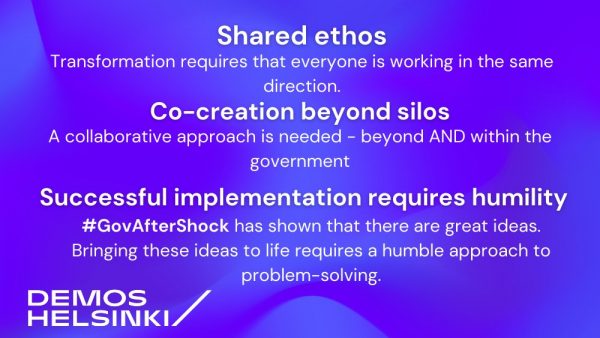We invited practitioners from Finland, Estonia and Germany to share and discuss learnings of what governments should do differently, and how. This is what we learned. In the midst of today’s global pandemic, governments are in the limelight. 2020 marks a fundamental shift in many aspects, and there is no…
We invited practitioners from Finland, Estonia and Germany to share and discuss learnings of what governments should do differently, and how. This is what we learned.
In the midst of today’s global pandemic, governments are in the limelight. 2020 marks a fundamental shift in many aspects, and there is no question that governments have a leading role to play in the success of societies. COVID-19 has been a perfect practice round for the challenges that lie ahead. It has become evident that today’s governance structures are too siloed, too short-term and too rigid to successfully address the 21st century wicked problems. At OECD’s 2020 Government after Shock event series Demos Helsinki presented how Finland is working to reimagine governance.
Permanent Under Secretary Päivi Nerg from the Ministry of Finance presented Finland’s new strategy for public governance of the 2020’s, which seeks to redefine the principles and guidelines of governance reform in Finland for the coming decade. Nerg stated that government authorities “need to have the ability to imagine futures that do not exist yet and paths that take us there” and presented the six goals that lead towards the Ministry’s vision for 2030.

The six goals for 2030: evidence-based action, intergenerational responsibility, diversity, trust, imagination and open government.
Counsellor Sirpa Kekkonen from The Prime Minister’s Office described how Finland is rethinking its policy-making approaches to enable a humble and continuously learning approach to governance. Currently, the Government’s policy-goals and policy-making processes do not match and therefore need to be re-thought. The Prime Minister’s office aims to move from top-down-steering to a humble approach in governance, implying that policy-making begins with an acknowledgement of the prevailing complexity and uncertainty and is thus built as a continuously iterative process, in which actors are willing to change their mind as new information arises.
Auditor General Tytti Yli-Viikari from the The National Audit Office, illustrated how the Audit Office seeks to rethink its role as an enabler and supporter of systemic change in government: “To stay relevant, we need to understand how we can develop new tools and methods”. She described how the National Audit Office has taken steps towards new ways of working by implementing experimentation in government and including insight and foresight to create oversight.
The case-examples were followed by a panel-discussion between Mr. Taimar Peterkop, Secretary of State in the Government of Estonia, Ms. Caroline Paulick-Thiel, co-founder and director of Politics for Tomorrow, and Mr. Stephan Naundorf, who manages the cooperation of the Federal Chancellery’s Better Regulation Unit. The concluding panel concluded, that in order for governments to navigate through transformation, three learnings must be taken seriously:
- Government’s cannot change unless everybody is on board. It is pivotal to create a shared ethos for government transformation.
- While co-creation of future solutions is important, we must be able to ideate beyond existing silos.
- Humility will be a guiding principle for successful collaboration within and beyond government.

Further information on the humble government approach can be found here.
